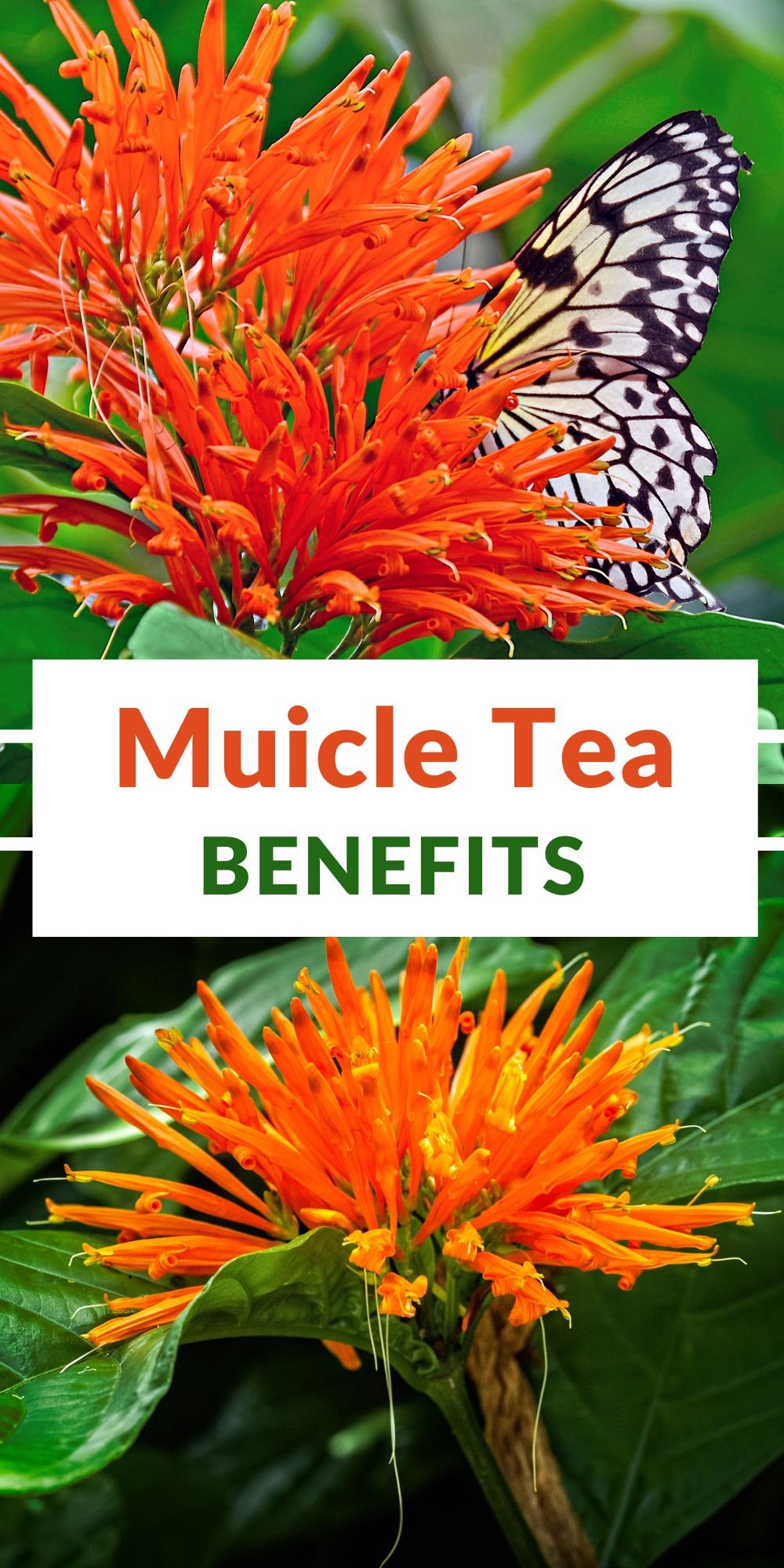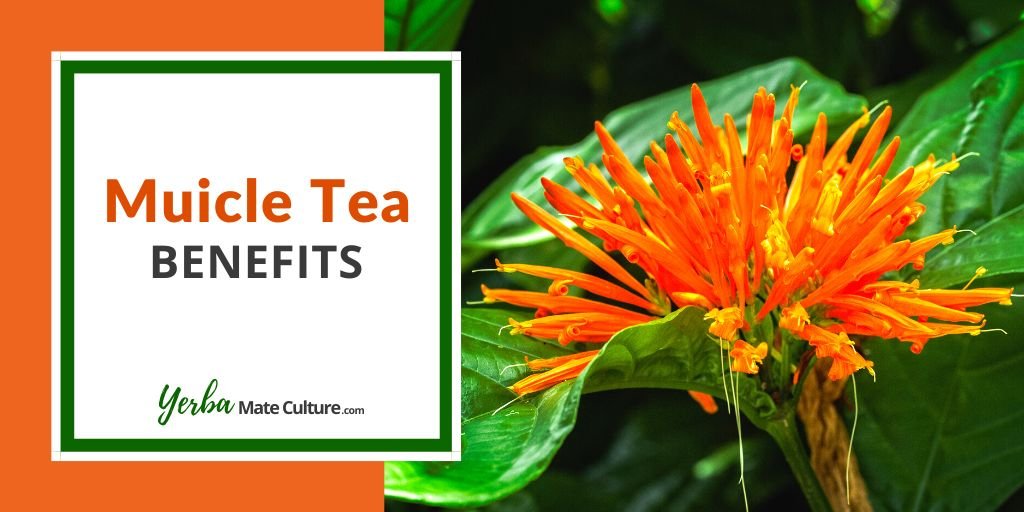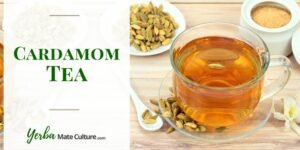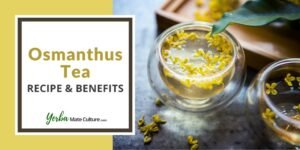Herbal remedies have been used for centuries worldwide. Passed down through the generations, our ancestors’ wisdom is the foundation of modern pharmacology.
Through observation, they learned about the healing properties of various herbs like the muicle plant. But only today’s science has finally revealed exactly how and why they work.
Muicle tea, also known as Mexican honeysuckle, is just the latest in a line of traditional medicines the people of Central America have introduced to the world. Tradition has it — and science agrees — that muicle tea has many potential benefits for your health.
What is Muicle Plant?
Justicia spicigera, also known as Mexican Honeysuckle or the firecracker bush, is a hardy evergreen bush native to Central America. A member of the mint family, it thrives in the dry, rocky outcroppings found in desert climates.
The plant boasts dark green leaves and 2-inch orange or yellow flowers that bloom nearly year-round, spraying out like fireworks when they open.
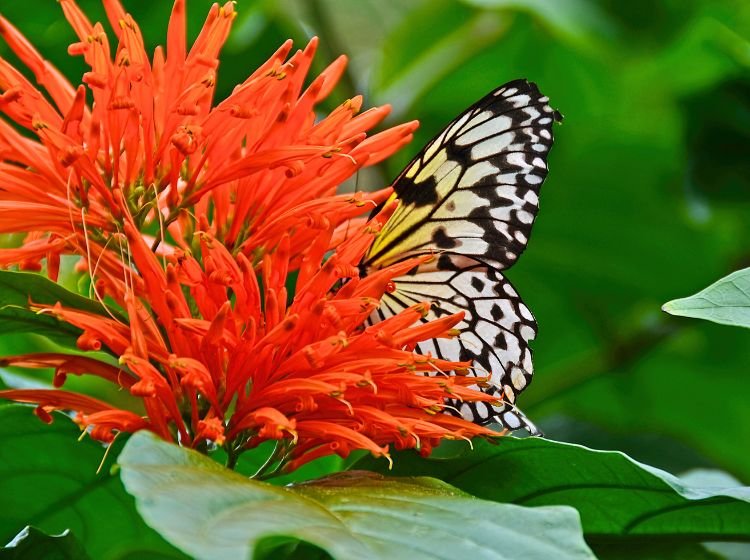
At an average height of 1-3 feet, Muicle is a colorful and fragrant plant used to attract hummingbirds and garden pollinators to arid landscapes. In Mexico, the leaves are boiled to make blue, purple, and indigo dyes for woolen textiles and basketry.
Historically, the plant has been used medicinally throughout the Central American region.
When brewed into tea, the leaves and flowers are believed to have diuretic, anti-inflammatory, and antiseptic properties that target a broad range of health conditions.
Muicle Tea Benefits Explained
Muicle tea contains plenty of antioxidants and other beneficial compounds that provide many benefits. While muicle’s pharmacological potential has not been fully investigated the research is promising.
Here are the most notable health benefits of muicle tea:
1. Helps Treat Arthritis
The Muicle plant contains several compounds that are known to reduce inflammation, including polyphenols and eugenol — a popular ingredient in over-the-counter pain treatments.
A cup per day may help tame the discomfort associated with osteoarthritis and gout.
2. Relieves Menstrual Symptoms
Muicle is a natural diuretic — a substance that helps the body excrete fluid through the urine. If you have swelling in your legs or feel bloated when menstruating, Muicle tea can help you shed unwanted water weight.
And for women who become anemic during their cycles, Justicia spicigera extract appears to stimulate the production of early red blood cells.
3. Reduces Hypertension
Research shows that the Muicle leaf infusion may be beneficial for reducing blood pressure. In addition to being a diuretic tea, it also contains flavonoids that help relax blood vessels.
4. Good for Diabetes
Animal studies suggest that Muicle could help diabetics control their blood sugar.
According to studies, the reductions were similar to those achieved by some diabetes medications. It appears to stimulate the uptake of glucose in fat cells while reducing insulin resistance.
5. Prevents Tooth Decay
Muicle has been shown to control Porphyromonas gingivalis and streptococcus mutans, the bacteria that cause tooth decay, gum disease and bad breath.
If you don’t like tea, you can still reap the beneficial effects by boiling it into a gargle or mouthwash.
6. Relieves Anxiety and Depression
Mental health disorders can be debilitating. And what’s worse, the medications used to treat them can have serious side effects.
Muicle appears to relieve symptoms of anxiety and depression — two disorders that commonly co-occur. The flavonoid kaempferitrin, the principal flavonoid found in Justicia spicigera, produces anxiolytic and antidepressant effects in rats with no evidence of toxicity in 14-day trials.
If you are suffering from anxiety or depression, you might also be interested in manglier tea, another interesting herbal remedy that can help with these issues.
7. Helps Fight Cancer
Muicle has been the focus of anti-cancer research for more than a decade.
Extracts appear to kill breast cancer cells and shrink prostate tumors by preventing malignant cells from multiplying. It also attacks free radicals, rogue cells within the body that can cause cellular damage.
8. Has Antibacterial and Antifungal Properties
The same antibacterial activity that helps Muicle fight gingivitis also makes it a powerful tool for fighting other infections.
Studies show that modest concentrations inhibit the growth of several dangerous bacteria, including drug-resistant strains of Staphylococcus aureus, Salmonella and E. coli as well as candida albicans, the fungus that causes oral thrush.
Another interesting herbal tea for treating candida albicans and other harmful bacteria in the gastrointestinal system is matula tea.
Muicle can also be used topically for skin irritations caused by yeast — brew a tea and dab it on.
Muicle Tea Side Effects
Muicle tea is generally considered safe, but Studies on its potential side effects are scant. While moderate amounts rarely cause any adverse effects, too much might not be good for you.
That’s why I recommend starting with only half-cup per day to see how your body reacts. Later you slowly increase the amount if you don’t notice any side effects.
The potential side effects of muicle tea include:
Hypotension: Muicle tea helps the body expel water. That’s good if you’re bloated or have swollen ankles. But if you already take diuretics or blood pressure medication, losing more fluid may cause low blood pressure, leading to dizziness or headaches. If you’re taking prescription medications, talk to your doctor before trying muicle tea.
Upset Stomach: Stomach irritation is possible with any new food or drink. While muicle tea is typically used to ease nausea, it’s possible that it won’t agree with you. Start with a half-cup and see what happens.
Diarrhea: Diuretics may cause diarrhea. Minerals are often lost with excess water, leading to a fluid imbalance in the intestinal tract. Like caffeine, alcohol, and other substances with a diuretic effect, it’s best to consume muicle in moderation until you’re familiar with its impact.
Allergic Reaction: Any herbal medicine can cause an allergic reaction. The lack of anecdotal reports, however, suggests the risk is low. But be cautious, especially if you’re sensitive to similar plants.
How to Make Muicle Tea
Preparing a cup of healthy muicle tea is easy. All you need is some loose leaf muicle tea and water, but I often add some honey and lemon to make it taste better.
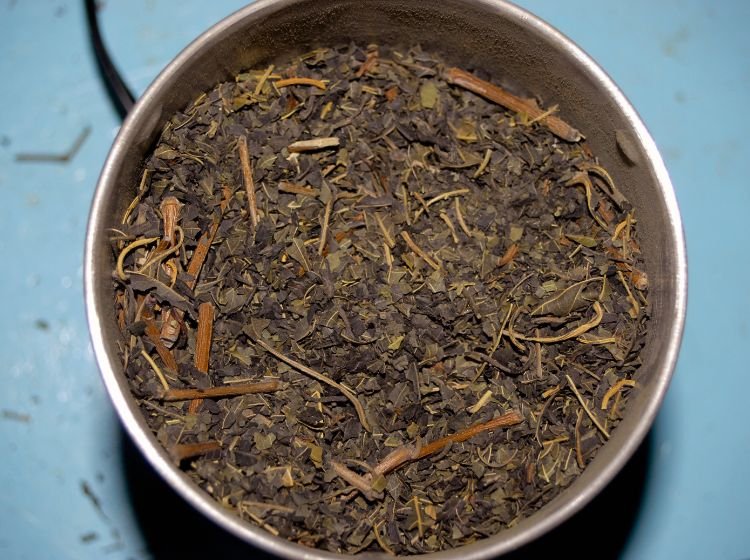
Here is how to make muicle tea:
- Boil some water in a sauce pan or a teapot.
- Add about 2 teaspoons of loose leaf muicle tea per cup (8 oz) of water.
- Simmer for about 10 minutes.
- Strain into a mug, add honey and lemon juice if you wish, and enjoy!
Are you growing your own Muicle plants in the garden?
You can follow the instructions below to make tea from it:
Where Can You Buy Muicle Tea?
Muicle tea is not very common and you probably can’t find it at your local grocery or even a health store.
The easiest option is to order Gabio Green Muicle Tea from Amazon. This wildcrafted muicle tea is guaranteed to be high-quality and GMO-free.
Final Thoughts on Using Muicle Tea
Muicle tea is a staple in the Hispanic medical community for its many health benefits, but the taste alone makes it worth a try. Unique among teas, the sweet honeysuckle flavor is as welcomed as the flavonoids
The mild taste is refreshingly earthy and slightly sweet!
Packed with nutrients, Muicle tea contains more antioxidants with known medicinal benefits compared to edible preparations made with ground flowers or leaves. So why not try it today?
Save on Pinterest:
